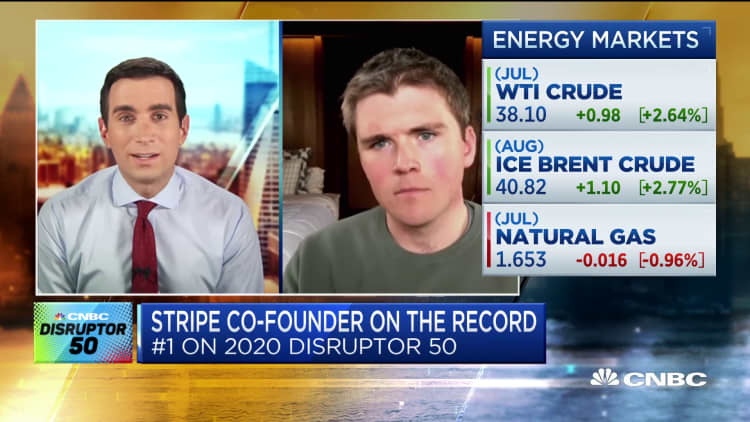
The Covid pandemic has upended the world's economy. But for Stripe and the digital economy, the virus was somewhat of an opportunity: Shelter-in-place and social distancing measures sparked a shift to online commerce that otherwise would have taken years.
"There has been a very sharp move from the offline economy to the online economy," John Collison, co-founder and president of Stripe, told CNBC's "Squawk Box" in an interview this week. "We're seeing the creation of new businesses, or businesses that previously traded solely offline, starting to move online."
San Francisco-based Stripe makes software that lets businesses accept payments online, with the mission of "increasing the GDP of the internet." Stripe's payments software brought in early investments from PayPal alumni Peter Thiel and Elon Musk. Its valuation has soared to $36 billion, with Stripe topping the list of Silicon Valley's most valuable companies. On Tuesday the company snared the top spot on CNBC's 2020 Disruptor 50 list.
More from Disruptor 50:
Meet the 2020 CNBC Disruptor 50 companies
The coronavirus-fueled tech trends that will continue to dominate daily life
Coupang has crushed Amazon to become South Korea's biggest online retailer
Even without a global pandemic, the company had seen enormous growth in recent years. Thousands of companies, including Lyft, Amazon, Slack, Glossier, Shopify, and Airbnb use Stripe's software tools to accept payments.
"They've made payment acceptance and now card issuance easier than ever and transformed a business into a technology decision," said Ryan Gilbert, fintech investor and general partner at Propel Venture Partners. "They changed the narrative."
Internet 'toll collector'
Stripe wasn't the first successful start-up idea for Irish brothers Patrick and John Collison. They had already founded and sold their first company, which made software to help eBay users manage inventory, before their 20th birthdays. The idea for Stripe came when the brothers were both in Cambridge, Massachusetts, attending MIT and Harvard.
The problem with payment platforms, as they saw it, wasn't on the finance side. Difficulties were more often because of coding and design issues. The brothers decided to build a developer-focused, instant setup payment platform that any company could use and scale.
They spent two years building the software, which has been applauded for its simplicity. In the earlier versions, it required websites to add less than ten lines of code to a website to handle payments.
"While the success of many leading consumer fintech companies hinges upon stealing customers from incumbent financial institutions, Stripe's biggest competition is incumbents' complacency," said CB Insights fintech analyst Conor Witt. "Given the acceleration of online commerce, combined with Stripe's expansion into emerging markets, the company is well positioned to serve as a global toll operator for internet commerce."
Stripe makes money from that role as a toll collector: It charges customers a swipe fee of 2.9%, plus 30 cents for every transaction it processes, similar to PayPal's revenue model. But it also has a venture capital war chest.
Given the acceleration of online commerce, combined with Stripe's expansion into emerging markets, the company is well positioned to serve as a global toll operator for internet commerce.Conor Wittfintech analyst at CB Insights
The company has a star-studded roster of investors. In April the company brought in an additional $600 million in equity from Sequoia, Andreessen Horowitz and General Catalyst — all existing investors. In addition to Thiel and Musk, the company has also raised money from Google's venture arm Capital G and Kleiner Perkins. Former Google Cloud CEO Diane Green sits on the board. To date it has raised $1.6 billion at a $36 billion valuation, according to PitchBook.
The latest cash buffer ensured the company would be able to provide reliable service, and keep investing, during the pandemic, Collison said.
"A huge part of the internet economy is relying on Stripe to provide stable, reliable service and to make the internet economy work," Collison said. "We're trying to make sure that we are just there for the businesses that are on Stripe, regardless of what happens over the next year or two."
Covid expansion
Like Stripe, many of its customers have seen rapid growth during Covid. Zoom, a new Stripe customer this year, saw a 20x surge in usage between December and March, according to the company. Instacart saw a 300% increase in customer demand year-over year, while Slack, another Stripe customer, saw an 80% increase in paid customers this quarter.
Stripe is also moving beyond payments into new areas of finance. In November the company announced the launch of a lending arm called Stripe Capital. The new venture is meant to help online companies borrow money to grow their businesses — which in turn helps Stripe's business. It did not apply to be a part of the government's emergency lending program, like fellow fintech players Square and PayPal.
Its Stripe Atlas platform, used for founding and registering a new business, saw a 220% rise in new companies being registered in April than the prior year.
The billionaire Collison brothers are known to stay out of the media limelight. But they are taking a stance on climate change. The company announced what it called the Negative Emissions Commitment, pledging at least $1 million per year to pay for the direct removal of carbon dioxide from the atmosphere and its sequestration in secure long-term storage. One strategy involves importing special sand to a remote Caribbean beach. They're also supporting FastGrants.org, which backs researchers and entrepeneurs working on Covid-related projects.
Despite the decade of growth, Stripe says the internet economy is "still in the early innings" and sees a runway for online commerce, pointing to the relatively low 11% of U.S. retail sales that happened online in the first quarter of the year. Stripe already has a global reach and operates in 39 countries and recently launched in Malaysia, Mexico, Czech Republic, Romania and others. Eighty four percent of all its enterprise customers use Stripe in multiple countries. But global expansion is a key growth strategy, the company says.
As for an IPO, Collison has said the company has "no plans" to go public right away.
"We're very happy as a private company," Collison told CNBC in a phone interview last year. "We're quite early in this opportunity."






